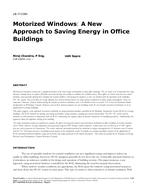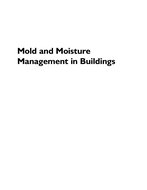Click here to purchase
In this extended abstract, we introduce the new IEA EBC Annex on ‘Energy Efficient IAQ Management in residential buildings’. In this Annex, we address a number of challenges in implementing smart IAQ management strategies. Annex 68 provided us with a general framework for integrated simulation and assessment of Energy Efficiency (EE) and chemical indoor air pollution. This framework can now be further extended to develop and assess a series of smart Indoor Air Quality (IAQ) management strategies. By mapping the existing work on the pollution sources in residential context, we develop a consistent set of metrics for assessing the performance of the various technologies in terms of energy efficiency, comfort and health for the occupants. This includes extending the framework developed in Annex 68 with specific metrics for energy efficiency and particulate matter, explicitly including moisture control and HVAC component modeling as well as creating a common methodology for IAQ data sharing among smart devices. By pooling and analyzing the data, the range of conditions in dwellings can be better understood and the most appropriate energy efficient IAQ management strategies can be identified. The application of the metrics over time also allows continuous commissioning and conveying the achieved performance to the occupants.In this Annex, we therefore optimize the energy efficiency of IAQ management by addressing these issues. For the IAQ management we mainly focus on the use of smart materials (materials that have an ability to actively influence IAQ situation in the space) and smart ventilation (as defined by AIVC VIP paper nr. 38), since these are the strategies that have a high EE potential (air cleaning is already studied in a separate Annex 78).
Citation: IAQ 2020: Indoor Environmental Quality
Product Details
- Published:
- 2021
- Number of Pages:
- 5
- File Size:
- 1 file
- Product Code(s):
- D-IAQ-20-A-03
- Note:
- This product is unavailable in Belarus, Russia


